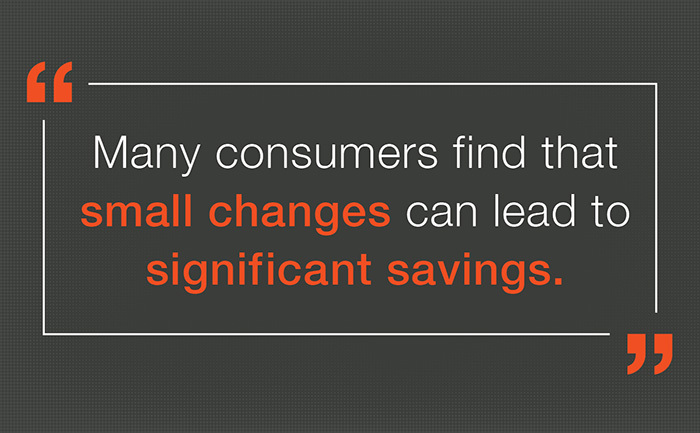Less energy, more savings
If you’re looking to fine-tune your budget, there are many categories to consider cutting back spending on. One category that’s often overlooked, however, is personal energy use. While you can’t make your utility bills go away, there’s a good chance you can limit how much they’re costing you.

If saving money on utilities isn’t enough of a motivator, consider the positive environmental impacts of using energy more efficiently. Here are a few steps you can consider taking:
- Turn off and unplug: It’s common knowledge to turn off the lights when leaving home, but what about unplugging other items when not in use? Even when not in use or turned off, your chargers, TV, computer, gaming consoles, Wi-Fi routers, and other plug in devices continue to use a small amount of energy. Completely unplugging these devices can lead to notable savings over time. For more immediate savings, consider how often you use your washer and dryer (try to hang dry clothes when possible, for example) and only run your dishwasher when it’s full.
- Opt for LEDs: According to the U.S. Department of Energy, lighting accounts for around 15 percent of the average household’s electricity use. But not all light is created equally: switching from incandescent bulbs to LEDs (light emitting diodes) can save you hundreds of dollars each year on your electric bills.
- Drive less: For many of us, it can be hard to avoid driving a car on a regular basis. But there’s a good chance we can be more mindful about our usage, such as opting for public transit when available, traveling by bike or on foot when possible, and planning an efficient route when driving (i.e. batching weekly errands into one car trip). You’ll help cut down on congestion and what you pay at the gas pump.
- Weatherize your home: Weatherization is the practice of making your home more resistant to the impacts of outside air, whether that’s keeping it cool inside during the summer or warm inside during the winter. Meaningful weatherization often involves an investment up front, but it will likely pay off over the years. Start by conducting a professional energy audit of your home to identify air leaks and places that would benefit from insulation. The U.S. Dept. of Energy offers further resources to help you weatherize your home effectively.
When it comes to living sustainably, it’s important to focus on making incremental and lasting changes to our habits. Many consumers find that small changes can lead to significant savings. It’s also worth checking with your utility providers to learn about energy saving programs or tips specific to your service. Once you’ve implemented any of these changes, be sure to track your energy bills to see the effects.



